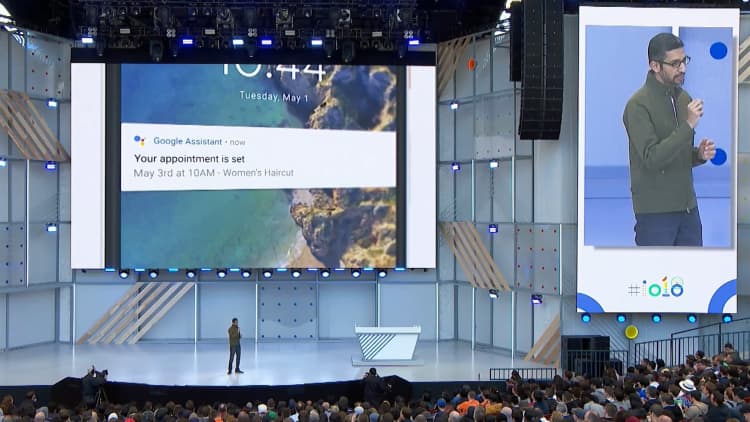
Google raised a lot of questions when it unveiled "Google Duplex" at its developers conference in early May. Duplex, as Google demonstrated in the video above, was a scary-smart virtual assistant capable of calling a restaurant to book a reservation.
A caller simply had to ask Google Assistant — the company's version of Siri — to book a reservation. Then, Google's computers called the restaurant and did the rest of the work.
The voice of Google's artificial intelligence sounded eerily human, even inserting sporadic "um"s and other mannerisms, and seemed to work perfectly — so much so, that media outlets such as Axios were skeptical that the demo was even real.
So Google invited a group of reporters to a restaurant in New York City earlier this week to try Duplex for ourselves ahead of its limited launch. I also had a chance to talk to engineers on the project about ethics concerns surrounding the technology. Here's what I learned.
Ethics
When Google revealed Duplex, some onlookers questioned whether it was ethical for Google to call humans without revealing that they were speaking to a robot.
Google is addressing this: When Assistant calls a host at a restaurant or hair salon it will reveal that it's artificial intelligence at the beginning of the conversation.
"Hi, I'm calling to make a reservation," the assistant said during my live demo. "I'm Google's automated booking service so I'll record the call. Can I book a table for Thursday?"
Businesses that are registered with Google Duplex ahead of time will be able to choose whether they want to allow these sorts of calls in the first place. Google said there's already been a lot of interest, however, particularly among restaurants that don't want to change their workflow where someone is on staff to answer the call and manage reservations.
I answered the phone when Duplex called
I had the chance to answer the phone and take a reservation from Duplex, much like a restaurant host or hostess could. It's pretty incredible how well it works.
A Google engineer initiated a call to the Thai restaurant where the demo took place. When I picked up the phone and said hello, a feminine voice said she would like to make a reservation for four.
"Ok," I said, "and when would you like to make it for?"
Google's robot -- sounding almost perfectly human save for some small pauses -- said "Um, for June 28."
"For what time?" I asked.
"For 7 p.m. please" the robot replied.
I told Google Duplex that I didn't have anything available until 8 p.m.
"8 p.m. is fine," it responded. I asked for a phone number and Google Duplex provided one, then we confirmed the appointment and I hung up.
In some ways it was easier than speaking with a human — the robot didn't argue with me about times or table requests, it just calmly and politely said the time, date and number of people it wanted to make a reservation for.
And it spoke like a human, not a robot, which was oddly more comforting and easier to speak to — the conversation just flowed better.
Google said this is by design.
The AI sounds human on purpose
Google uses "ums" and "ahs" in conversation, a phenomenon linguists refer to as "speech disfluencies," according Google's vice president of engineering for Google Assistant, Scott Huffman.
"Robotic-sounding systems didn’t work," Huffman explained. "They got a lot of hangups and the conversations would break down. Conversations with speech disfluencies are more natural and human, so the success rate of making appointments went up in our tests. So we brought in 'ums' and 'ahs.' We want to communicate 'I heard you.' 'I acknowledge that,'" Huffman said. These hesitations also allow the AI to deal with uncertainty — perhaps it didn't hear a confirmation correctly — in a polite way. Instead of correcting the person on the phone by saying "no, 5 p.m.," which can be seen as rude, the AI can say "um, for 5 p.m.?" raising its voice at the end, and it seems friendlier.
I couldn't help but wonder why Google wanted to deal with creating a system like this in the first place, though. Why not just create software that competes with OpenTable, and have it automatically populate reservations made by people? Why even make us place a phone call?
Google's vice president of product and design for Google Assistant, Nick Fox, said Google doesn't want to compete with OpenTable, which is owned by Priceline-parent . "Restaurants already have a process and a workflow, so they might not want to deal with all of that," Fox said. He added that Google is currently only working with businesses that don't already have a booking system like OpenTable in place.
Coming soon
Despite how convincing Duplex was in our demos, it's still a "very early stage" technology, according to Huffman and Fox, and Google knows it needs to get right in order for it to be accepted by customers and businesses.
In the coming weeks, a small number of Google users will be able to try Duplex by asking it for holiday hours at restaurants. Support for booking restaurant reservations and haircut appointments will be added later this summer.


